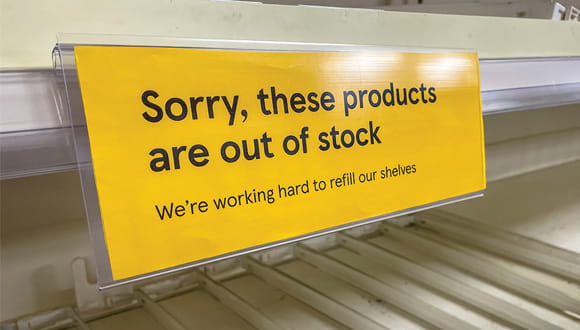As a parent of an infant, you're well aware of the ongoing infant formula shortage.
The cause of the shortage is more complex than the typical supply chain disruptions we're accustomed to hearing about these days. Baby formula stock has indeed been affected by supply chain issues, but something else has contributed to the more dire circumstances parents now find themselves in — the February shutdown of a major baby formula production facility due to safety concerns.
There's some good news, though: The manufacturer announced Monday that the FDA has cleared its production facility to re-open.
Unfortunately, new product from this facility isn't expected to be stocked on shelves for another six weeks at least, so the shortage will continue for a while longer.
In the meantime, here are some tips for safely navigating the baby formula shortage.
Do consider using any formula brand available
"In most cases, it's fine to switch to whichever formula brand is stocked on the shelf," says Tammy Sullivan, NICU manager and Maternal Child Director at Houston Methodist. "The exception is if your baby has very specific nutritional needs and the exact formula needed is not stocked."
For instance, if your baby has been on an extensively hydrolyzed or amino acid-based formula, you will need to consult with your pediatrician prior to purchasing a store-brand formula.
Do try buying directly from the manufacturer online
In addition, try ordering online from wholesale and big box stores.
"These stores all stock their formula online and it might be easier to find the product your baby has been eating," adds Sullivan.
Indeed, if time permits, search everywhere — including pharmacies and establishments you might not necessarily think of when it comes to baby formula, like convenience stores.
Do contact your pediatrician with questions
If you have any doubt about a decision you're making during the formula shortage, reach out to your pediatrician for help and clarification. Your pediatrician or your OB-GYN may also be able to make recommendations regarding where to find formula.
"Your pediatrician can also answer questions about lactation and help you feel more confident about breastfeeding your baby during the shortage," says Sullivan.
Do seek lactation support if you need help breastfeeding
If breastfeeding is an option for you, but you need help, there are many resources for lactation support, including the Special Supplemental Nutrition Program for Women, Infants and Children (WIC).
(Related: 5 Breastfeeding Tips for New & Expectant Moms)
"In addition, many pediatrician offices work with local lactation consultants to support breastfeeding mothers," Sullivan adds.
Don't water down formula
It may seem like a way to extend your supplies during the shortage, but watering down baby formula isn't safe.
"When baby formula is watered down, its nutritional content is diluted," warns Sullivan. "This can cause serious health conditions, and, in some cases, could lead to death."
Don't make your own formula at home
Infant formula is designed to imitate the nutritional content of breastmilk, and doing so takes meticulous research, development and testing. It's a process that takes years.
"Homemade recipes are not able to adequately meet the nutritional needs of a growing infant and could even be dangerous," Sullivan warns.
Don't assume it's OK to switch your baby to cow's milk
If your baby is younger than six months, cow's milk is never a suitable replacement for formula.
"If your baby is 6 months or older, cow's milk might be an option to use for a very short-term basis if you're unable to find his or her standard formula," says Sullivan. "However, it's critical to speak to your pediatrician before using cow's milk and make sure your infant is receiving enough iron through his or her diet or through an iron supplement."
Don't give toddler formula to a newborn
"Using toddler formula for a newborn is not recommended," warns Sullivan. "If your baby is closer to a year in age and you have no other alternative, a toddler formula might be used for a few days until the standard infant formula becomes available."
Don't use expired formula
Even during a shortage, the safest option is to toss any formula that's expired.
"Over time, the nutrients in a can of formula can degrade," says Sullivan. "The FDA regulates the nutritional content of formula and requires an expiration date to ensure that the formula has no less nutrients than the product label shows."
So if you're using formula beyond its expiration date, there's no guarantee that it still contains an adequate nutritional content for your baby.
Don't take breast milk from another mom
"Breastmilk is a bodily fluid that can carry transmissible diseases," warns Sullivan. "Medications can also be transferred through breastmilk. Therefore, it is not safe to use another woman's breastmilk."
Certain organizations that collect donated breastmilk may be a safe alternative to consider.
"For instance, women who donate breastmilk to The Mother's Milk Bank of Austin are medically screened prior to donating and the milk is pasteurized prior to use," Sullivan adds.


